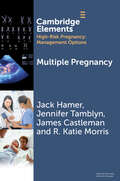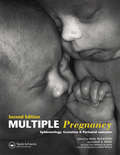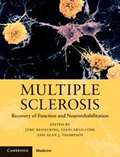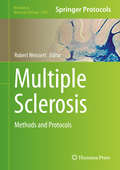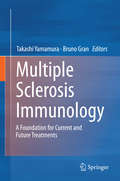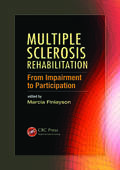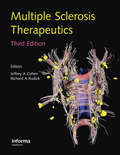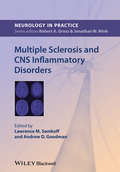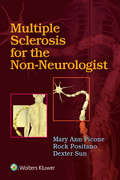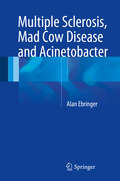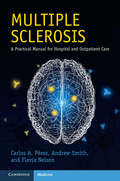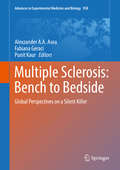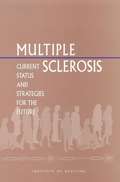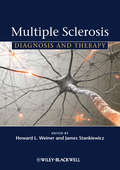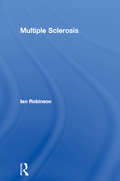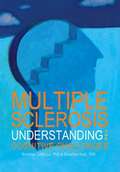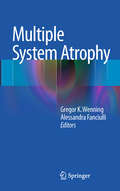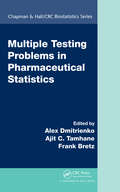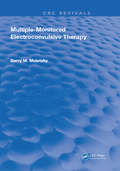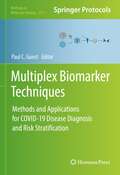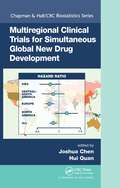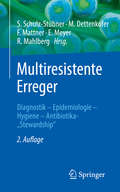- Table View
- List View
Multiple Pregnancy (Elements in High Risk Pregnancy: Management Options)
by Jack Hamer Jennifer Tamblyn James Castleman R. Katie MorrisMultiple pregnancy affects 0.9-3.1% of births worldwide. Prevalence rates vary significantly due to differences in dizygotic twinning rates and use of assisted reproduction (AR). Both maternal and fetal/neonatal complications are more common in multiple compared to singleton pregnancies and there are specific problems for the fetuses related to monochorionicity. Multiple pregnancies require specialized and individualized care. Complicated multiple pregnancies should be managed in a tertiary care centre where there is additional expertise, such as the laser ablation needed to treat monochorionic monozygotic pregnancies with conjoined circulations. Cornerstones of management in pregnancy are the need for accurate fetal measurement to optimise dating of gestational age, and documentation of chorionicity. High level ultrasound expertise is needed. The mothers need frequent assessment to detect hypertension and anemia, and early identification and management of preterm labor.
Multiple Pregnancy: Epidemiology, Gestation, and Perinatal Outcome
by Isaac BlicksteinEstablishing the study of multiple pregnancy and the perinatal care of children from multiple births as a recognized specialty within maternal-fetal medicine, the first edition of Multiple Pregnancy was a landmark publication. Fully revised, this new Second Edition has been expanded to include more on epidemiology, biologic mechanisms, the impact o
Multiple Sclerosis
by Jürg Kesselring Giancarlo Comi Alan J. ThompsonIn multiple sclerosis (MS), conventional magnetic resonance imaging (cMRI) has proved to be a valuable tool to increase diagnostic confidence and for monitoring the efficacy of experimental treatment. However, cMRI has limited specificity and accuracy of cMRI to the most disabling aspects of the MS pathology, known to occur in and outside macroscopic lesions. Modern quantitative MR techniques have the potential to overcome the limitations of cMRI, and their application is changing dramatically our understanding of how MS causes irreversible disability. In detail, there is an increasing body of MR evidence that MS is not only a white matter disease and does not only cause focal lesions, as well as that neurodegeneration is an important aspect of the disease (since the earliest clinical phases), which is only partially related to inflammatory changes. There is also increasing perception that modern MR methodologies should be more extensively employed in clinical trials to derive innovative information. Written by world-renowned scientists, the volume provides a state-of-the-art on the most recent MRI techniques related to MS, and it will bi and indispensable tool for all those working in this field.
Multiple Sclerosis
by Robert WeissertThis detailed volume covers molecular biology, cellular biology, biomarkers, imaging, and neuropathological methods and techniques to explore multiple sclerosis (MS), with a special emphasis on disease models. With so much effort needed to elucidate basic disease mechanisms, to clone disease relevant genes, to define novel biomarkers, and to discover novel and improved therapeutic and curative treatments, this book serves to aid researchers in accomplishing these enormous goals. Written for the highly successful Methods in Molecular Biology series, chapters include introductions to their respective topics, lists of the necessary materials and reagents, step-by-step, readily reproducible laboratory protocols, and tips on troubleshooting and avoiding known pitfalls. Practical and easy to use, Multiple Sclerosis: Methods and Protocols will empower the reader to perform novel research regarding pathophysiology and treatment for MS.
Multiple Sclerosis Immunology
by Takashi Yamamura Bruno GranThe availability of powerful genome-wide association study technology, during the last five years, has shown that most of the "new" MS susceptibility loci are immune-response genes. It is clear that there is much novelty in the field of MS immunology, which has served as an impetus to invest in new therapies. Notably, most if not all of these are immunotherapies. Even the equally exciting field of cell-based therapies and neuro-regeneration may well rely on cells or growth factors that are no less immunomodulators than restorative of myelin and neural cell function. Multiple Sclerosis Immunology looks at MS immunology as the basis for the present and--even more--the future of treatments for this complex autoimmune condition. Both editors are immunologists, as well as clinical neurologists, and appreciate the importance of a sustained dialogue between basic and clinical scientists to ensure that "translation" is real and not just virtual.
Multiple Sclerosis Rehabilitation: From Impairment to Participation (Rehabilitation Science in Practice Series)
by Marcia Finlayson"MS is always in the back of your mind. If there is something you want to do, you always wonder if the MS will allow you do to it."-Darlene, living with MS for 22 yearsLiving with multiple sclerosis (MS) is challenging and multidimensional. MS pervades all aspects of life: one's body becomes unpredictable and unreliable, one's identity and sense of
Multiple Sclerosis Therapeutics
by Eli Minkoff Eli BakerSince the publication of the previous edition of this volume, there has been substantial progress in a number of areas of multiple sclerosis (MS) research. Although immunosuppressive treatments continue to be developed and refined, more targeted immunomodulatory therapies are surfacing as we learn more about how the immune system works in health an
Multiple Sclerosis Therapeutics
by Jeffrey A. Cohen Richard A. RudickThis book comprehensively reviews the current state of clinical trial methods in multiple sclerosis treatment, providing investigators, sponsors and specialists with current knowledge of outcome measures and study designs for disease and symptom management. The status of the rapidly evolving field of disease-modifying drugs is presented, with emphasis on the most promising therapies currently being tested. Experts discuss disease and symptom management for MS subtypes, including neuromyelitis optica and pediatric MS. In addition, key scientific advances in MS pathology, genetics, immunology and epidemiology are presented. The fourth edition has been extensively revised, featuring more than 50% new material. All chapters have been substantially updated to provide current information on rapidly evolving topics and this volume contains 15 new chapters, reflecting the growth of the field in recent years. This book is an essential reference for practitioners caring for MS patients, investigators planning or conducting clinical trials, and clinical trial sponsors.
Multiple Sclerosis and CNS Inflammatory Disorders
by Lawrence M. Samkoff Andrew D. GoodmanMultiple Sclerosis and CNS Inflammatory Disorders is a practical guide to effective care of patients with multiple sclerosis and other neuroimmunologic and CNS inflammatory disorders.It provides the scientific basis of multiple sclerosis including etiology, epidemiology, and pathogenesis. It covers the diagnostic process, the course of the disease and prognosis, and the use of MRI in diagnosis and disease monitoring. Disease-modifying treatment algorithms for relapsing-remitting multiple sclerosis, switching therapy, and progressive multiple sclerosis treatment algorithms are all discussed in detail. It also addresses multiple sclerosis in childhood and pregnancy and includes assessment of alternative therapies.This new addition to the Neurology in Practice series contains practical guidance and learning features:* Algorithms and guidelines* "Tips and Tricks" boxes on improving outcomes* "Caution" warning boxes to avoiding problems* "Science Revisited"--quick reminders of the basic science principles necessary for understandingMultiple Sclerosis and CNS Inflammatory Disorders is an ideal reference for neurologists in practice and training.
Multiple Sclerosis for the Non-Neurologist
by Mary Ann PiconeRecent rapid changes in the field of multiple sclerosis management have made the task of staying well-informed a challenge for neurologists, and even more so for other healthcare practitioners who are involved in symptom evaluation and treatment. Multiple Sclerosis for the Non-Neurologist is an up-to-date resource for physicians, residents, fellows, and others who care for patients with MS. It contains authoritative information on all aspects of this complex disease, including monitoring requirements for patients with MS, potential risks and adverse events of disease modifying or symptomatic therapies, and possible drug interactions and contraindications of medications.
Multiple Sclerosis, Mad Cow Disease and Acinetobacter
by Alan EbringerThe aim of this book is to publicise and bring to a wider audience the concept that the cause of two neurological diseases, namely multiple sclerosis (MS) and "mad cow disease" also known as "bovine spongiform encephalopathy" are related through exposure to a common microbe Acinetobacter which is found in human sinuses, on skin and in the soil. An infection is the cause of a neurological disease in man and in animals. Elevated levels of antibodies to Acinetobacter have been found in multiple sclerosis patients as well as in ruminants who have been described as suffering from "mad cow disease" following exposure to contaminated feed supplements. The overall objective and scope of this book is to inform the audience, the reader, that multiple sclerosis may be linked to a microbe Acinetobacter which carries molecular structures resembling myelin, the outer sheath covering of neurons.
Multiple Sclerosis: A Practical Manual for Hospital and Outpatient Care (Cambridge Manuals in Neurology)
by Andrew Smith Carlos A. Perez Flavia NelsonAffecting an estimated 2.5 million people worldwide, multiple sclerosis (MS) is the most common neurological cause of debilitation in young adults. Incurable, and with the precise causes still unknown, both diagnosis and management of the condition is complicated. This book summarizes the latest understanding of the causes of the disease, using accessible, bullet-point text to describe key clinical features and diagnostic criteria. Disease-modifying therapies and management of symptoms, including fatigue, tremor and cognitive changes, are covered in detail. With a chapter focusing solely on presentations in the emergency room, the importance of recognizing these neurological emergencies is emphasised, along with indications for admission in MS patients. The impact of MS on women's reproductive health and the increasing recognition of MS in pediatric patients is also explored. An up-to-date and practical approach to the accurate diagnosis and management of MS, this is an invaluable resource for both hospital and outpatient settings.
Multiple Sclerosis: Bench to Bedside
by Alexzander A. A. Asea Punit Kaur Fabiana GeraciMultiple Sclerosis (MS) is one of the main causes of disability in young adult population. The estimated burden of the disease worldwide is about three million people. The pathogenic mechanism of MS involves both auto immune and degenerative processes. These two mechanisms are thought to determine a combination of events leading to several clinical pattern of disease onset and course. Multiple Sclerosis: Bench to Bedside provides the most up-to-date and concise reviews on the critical issues of multiple sclerosis from around the world. This book is written by leaders and experts in the field of multiple sclerosis research and is divided into easy to read sections. Section I focuses on basic science aspects of Multiple Sclerosis, including potential biomarkers, molecular biology, heat shock proteins, oxidative stress, genetic and epigenetics. Section II focuses on clinical and epidemiological aspects of Multiple Sclerosis, including remyelination therapy, neuroplasticity-based technologies and interventions. This is an important reference book and a must-read for Postgraduate Medical Scholars, Basic Science Researchers and Neurologists in Clinical Practice.
Multiple Sclerosis: Current Status And Strategies For The Future
by Institute of MedicineMultiple sclerosis is a chronic and often disabling disease of the nervous system, affecting about 1 million people worldwide. Even though it has been known for over a hundred years, no cause or cure has yet been discovered-but now there is hope. New therapies have been shown to slow the disease progress in some patients, and the pace of discoveries about the cellular machinery of the brain and spinal cord has accelerated.This book presents a comprehensive overview of multiple sclerosis today, as researchers seek to understand its processes, develop therapies that will slow or halt the disease and perhaps repair damage, offer relief for specific symptoms, and improve the abilities of MS patients to function in their daily lives.The panel reviews existing knowledge and identifies key research questions, focusing on: Research strategies that have the greatest potential to understand the bio- logical mechanisms of recovery and to translate findings into specific strategies for therapy. How people adapt to MS and the research needed to improve the lives of people with MS. Management of disease symptoms (cognitive impairment, depression, spasticity, vision problems, and others). The committee also discusses ways to build and financially support the MS research enterprise, including a look at challenges inherent in designing clinical trials. This book will be important to MS researchers, research funders, health care advocates for MS research and treatment, and interested patients and their families.
Multiple Sclerosis: Diagnosis and Therapy (Perspectives Cshl Ser.)
by Howard L. Weiner James M. StankiewiczMultiple Sclerosis: a complex disease requiring sophisticated management Multiple Sclerosis poses labyrinthine challenges. There is no blood test to rely on for diagnosis; clinical acumen is essential. Yet an effective diagnosis only takes you part of the way: treatment offers further enigmas. The MS treatment landscape is complicated, and will become even more so with time. Multiple Sclerosis: Diagnosis and Therapy is the map you need to navigate this maze. Written and edited by leaders in the field, it guides you towards effective and positive choices for your patients. The diagnosis section provides state-of-the-art thinking about pathogenesis. With clear coverage of biomarkers, genetics, and imaging, it presents a coherent framework for making the correct diagnosis. The management section comprehensively covers current and future treatments to steer you through the many options for • Symptom management • Cognitive dysfunction • Depression and other mental health issues ‘Top Tips’ throughout provide the practical guidance you need for the best management of your patients. Multiple Sclerosis: Diagnosis and Therapy should be on the bookshelf of anyone who treats patients with multiple sclerosis.
Multiple Sclerosis: Practical Advice To Help You Manage Your Multiple Sclerosis
by Ian RobinsonMultiple Sclerosis affects hopes and expectations, restructures relationships, modifies careers and changes lives. It is a disease of variable onset, problematic diagnosis, unpredicatable prognosis and no effective treatment. Using unique autobiographical accounts of people with the disease, Ian Robinson sensitively portrays the difficulties and frustrations of the struggle to make sense of the clinical diagnosis and management of an illness which is effectively a way of life.
Multiple Sclerosis: Understanding the Cognitive Challenges
by Nicholas Larocca Rosalind KalbWritten by two clinical psychologists with contributions from two neuropsychologists -- each an MS specialist -- Multiple Sclerosis: Understanding the Cognitive Challenges answers all questions patients may have about their condition, including: A definition of cognition and discussion of the processes that underlie human thought The emotional and social impact of cognitive changes The neuropsychological evaluation of cognitive symptoms Detailed overview of treatment options Vignettes describing the real-life experiences of people with cognitive dysfunction Extensive references to the scientific literature Combining detailed, referenced advice with hands-on strategies for living, this is the only book to provide in-depth information about cognitive dysfunction. It will be an invaluable reference to patients, families, and caregivers, as well as to health professionals who care for people with MS.
Multiple System Atrophy
by Gregor K. Wenning Alessandra FanciulliThis textbook provides a comprehensive monography on multiple system atrophy (MSA), a rare and fatal neurodegenerative disorder that presents with autonomic failure and either parkinsonism (MSA-P) or cerebellar ataxia (MSA-C). The underlying neuropathology of MSA is characterized by striatonigral degeneration (SND), olivopontocerebellar atrophy (OPCA) and unique oligodendroglial cytoplasmic alpha-synuclein inclusions. MSA is therefore classified among the alpha-synucleinopathies such as Parkinson`s disease, pure autonomic failure and dementia with Lewy bodies. Over the last decade there have been important advances in early diagnosis, pathogenesis research and clinical trial activity. The monography will cover the entire spectrum ranging from molecular and genetic work to symptomatic and interventional therapies. The book is written for movement disorder clinicians and basic neuroscientists interested in degenerative movement disorders.
Multiple Testing Problems in Pharmaceutical Statistics (Chapman & Hall/CRC Biostatistics Series)
by Ajit C. Tamhane Alex Dmitrienko Frank BretzUseful Statistical Approaches for Addressing Multiplicity IssuesIncludes practical examples from recent trials Bringing together leading statisticians, scientists, and clinicians from the pharmaceutical industry, academia, and regulatory agencies, Multiple Testing Problems in Pharmaceutical Statistics explores the rapidly growing area of multiple c
Multiple True False Questions for the Final FFICM
by Mbbs Frca Fficm Emma Bellchambers Bmedsci Bmbs Mrcp FRCA Keith Davies MA Fficm Abigail Ford Mbchb FRCA Benjamin Walton MBChB Keith Davies Ma Abigail Ford Benjamin Walton MbchbFollowing the introduction in 2013 of the FFICM exam for trainees in intensive care, this book provides candidates with practice materials for the MCQ section. Written by a team of specialists in intensive care medicine, including senior trainees who have recently passed the new exam and authors of the popular FRCAQ website, the book contains 270 multiple true-false questions that cover the breadth of the current Faculty of Intensive Care Medicine curriculum. These are presented as three 90-question practice papers, providing candidates with a faithful simulation of the style, standard and format of the questions they will encounter. With short and long explanations for each question, presented with up-to-date references for extended reading, this book is both an ideal tool for in-depth exam preparation, and an excellent resource for practising consultants in intensive care medicine. It is also suitable for candidates taking the EDIC and other intensive care exams worldwide.
Multiple-Monitored Electroconvulsive Therapy (Routledge Revivals)
by Barry M. MaletzkyFirst published in 1981: This book will explain the development and rationale for MMECT, document its safety and efficacy, and just as importantly, describe the equipment and technique in sufficient detail to allow the reader to duplicate it if he desires.
Multiplex Biomarker Techniques: Methods and Applications for COVID-19 Disease Diagnosis and Risk Stratification (Methods in Molecular Biology #2511)
by Paul C. GuestThis detailed volume explores the application of multiplex biomarker methods in the critical area of COVID-19 research through state-of-the-art technologies in the fields of genomics, proteomics, transcriptomics, metabolomics, and imaging. The book features a series of protocols from labs across the globe employing multiplex molecular approaches, which can be applied to accelerate progress in the research of SARS-CoV-2 and other infectious illnesses. Written for the highly successful Methods in Molecular Biology series, chapters include introductions to their respective topics, lists of the necessary materials and reagents, step-by-step, readily reproducible laboratory protocols, and tips on troubleshooting and avoiding known pitfalls. Authoritative and essential, Multiplex Biomarker Techniques: Methods and Applications for COVID-19 Disease Diagnosis and Risk Stratification serves as a vital resource for researchers in the areas of virology, metabolic diseases, respiratory disorders, as well as to clinical scientists, physicians, pharmacologists, and the healthcare services.
Multipotent Stem Cells of the Hair Follicle
by Robert M HoffmanThis volume discusses methods for the study of multipotent and pluripotent stem cells of the hair follicle. The stem cells described are involved in both the growth of the hair follicle and its production of the hair shaft, as well as the growth of the hair follicle sensory nerve. "Multipotent Stem Cells of the Hair Follicle: Methods and Protocols" also explores very unexpected results such as that of the hair follicle-associated-pluripotent (HAP) stem cells, which not only have the capability for regenerating the hair follicle sensory nerve, but also can differentiate ex vivo and in vivo to multiple cell types not associated with the hair follicle these include glial cells, motor neurons, and beating cardiac muscle cells. The potential for HAP stem cells for regenerative medicine is also discussed in detail. Written in the highly successful "Methods in Molecular Biology "series format, chapters include introductions to their respective topics, lists of the necessary materials and reagents, step-by-step, readily reproducible laboratory protocols, and tips on troubleshooting and avoiding known pitfalls. Cutting-edge and thorough, "Multipotent Stem Cells of the Hair Follicle: Methods and Protocols "is a valuable resource for researchers interested in this field. "
Multiregional Clinical Trials for Simultaneous Global New Drug Development (Chapman & Hall/CRC Biostatistics Series)
by Joshua Chen Hui QuanIn a global clinical development strategy, multiregional clinical trials (MRCTs) are vital in the development of innovative medicines. Multiregional Clinical Trials for Simultaneous Global New Drug Development presents a comprehensive overview on the current status of conducting MRCTs in clinical development. International experts from academia, in
Multiresistente Erreger: Diagnostik - Epidemiologie - Hygiene - Antibiotika-„Stewardship"
by Rolf Mahlberg Sebastian Schulz-Stübner Markus Dettenkofer Frauke Mattner Elisabeth MeyerIn dem vorliegenden Werk beschreiben ausgewiesene Experten, welche diagnostischen und allgemeinen therapeutischen Maßnahmen bei Infektionen mit multiresistenten Erregern sinnvoll und erfolgsversprechend sind. Das Werk wendet sich an alle Ärzte in allen Einrichtungen des Gesundheitswesen, die Patienten mit Infektionen durch multiresistente Erreger betreuen. Es beschreibt darüber hinaus die Mechanismen der Resistenzentwicklung gegen Antibiotika und wie sich diese vermeiden lassen – im Krankenhaus, in der Arztpraxis und in der Veterinärmedizin. Auch auf die psychologischen Aspekte im Umgang mit Patienten, Angehörigen, medizinischem Personal und der Öffentlichkeit bei Infektionen durch MRE gehen die Autoren ein. Die 2. Auflage erscheint komplett aktualisiert mit Ausblicken auf zukünftige Entwicklungen. Aus dem InhaltGeschichtliche Entwicklung und Public Health-Aspekte von Infektionen mit multiresistenten ErregernArt der Resistenz, Diagnostik, Screening, Epidemiologie, krankenhaushygienische Maßnahmen und Therapie von multiresistenten Staphylococcus aureus (MRSA), multiresistenten gramnegativen Erregern (MRGN), Vancomycin resistenten Enterokokken (VRE) und „multidrug resistent tuberculosis“ (MDR-TB)Primärprävention der Resistenzentwicklung gegen AntibiotikaPsychologische Aspekte im Umgang mit MRE aus Sicht von Patienten, Angehörigen, des medizinischen Personals und der Öffentlichkeit
